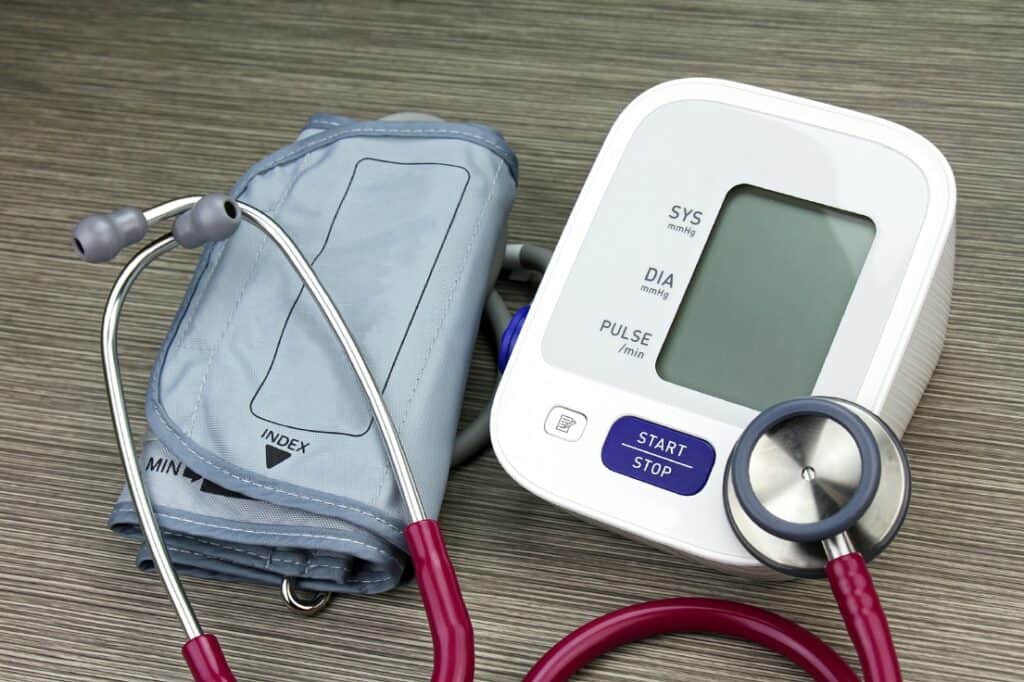10 Tips for Night Shift Nurses: New Nurse Survival Guide
Are you a new night shift nurse looking for practical tips on how to make the most of your new schedule? If so, then you’ve come to the right place! Working night shift is doable, and we’ve compiled 10 tips for night shift nurses that should help you adjust and survive night shifts.
In this blog post, we’ll cover information on how to properly prepare for working the late night shift schedule. From what a healthy snack you should eat to keeping your sleep schedule as consistent as possible – we’ve got some essential advice for you.
Plus I’ll answer some common questions many nurses have when they start working nights. So, let’s get started and make sure you get the best out of your first night shift!

This post is for general informational and educational purposes only. You can read the full disclaimer for more information.
Tips for night shift nurses
Here are my top tips for nurses working night shift:
1. Get enough sleep:
Make sure you are getting enough rest before your shift. Try to get at least 6-7 hours of quality sleep during the day before your shift starts. In addition, try to take a nap during the afternoon for an extra boost. Sticking with a consistent schedule is key to being rested and alert at work. So sleep hygiene is also important. You can do things like use blackout curtains to sure your bedroom is dark and cool, limit screen time before bed, and avoid exercising late at night.
2. Prepare ahead of time:
It’s important to have all the necessary supplies for nursing practice ready before your shift begins. This includes your stethoscope, shears, favorite pen, and any other supplies you may need. You should also have a clear plan on how you’ll handle expected tasks and any unexpected events that could arise this includes anticipating the morning rush.

3. Stay organized:
Having an organized workspace will help you stay on top of your tasks and make sure you are not forgetting anything. Make a list for each patient that includes their medication times and tasks to be completed. To avoid forgetting tasks while caring for multiple patients, it’s helpful to keep your space neat and organized in order to stay focused.
4. Take breaks:
No matter how busy your shift might be, make sure you are taking regular breaks. This helps prevent burnout and keeps you alert. If you’re feeling overwhelmed, take a few minutes to step away and get some fresh air. Make sure you are also taking your allotted meal, ideally in the break room away from the floor. It’s important to take care of yourself and recharge during your shift so you can remain productive throughout the night.
5. Stay hydrated:
Drinking plenty of water throughout your shift helps you remain alert and energized. It’s easy to forget to drink water when you’re busy, so make sure you have a bottle nearby and take regular sips. This will help keep your body hydrated and reduce fatigue. Avoid sugary drinks or other energy drinks as these can cause you to crash and make it harder for you to stay alert.

6. Limit caffeine:
Caffeine can make it difficult for you to fall asleep during the day, so try to limit your caffeine intake during your shift but especially towards the end of your shift. Caffeine provides a quick jolt of energy, but it can also lead to a crash later on. Herbal or green tea can make a nice alternative to caffeinated drinks.
7. Eat healthy snacks:
Snacking throughout the shift can help keep you energized and alert. Try to maintain a consistent meal schedule with healthy snacks like dried fruits, nuts, or yogurt. Avoid processed foods that have high amounts of sugar or fat as these lead to a crash in energy levels later on.
8. Connect with your colleagues:
Working night shifts can be lonely, so reach out to your night shift colleagues and connect. You don’t have to engage in long conversations but having a few conversations throughout the shift can help make it more doable. Support each other and talk about how you’re feeling. Working together can make night shift hours more manageable.

9. Listen to calming music or podcasts during downtime:
Find calming music or podcasts to listen to during periods of downtime. It can you relax and refocus when is a lull in activity. Music can also be soothing and help you wind down after a hectic shift. Listening to podcasts or audiobooks can also help make the whole night shift work even more enjoyable.
10. Be mindful of your mental health:
Working night shifts can take a toll on your mental and emotional health, so be sure to practice self-care. This includes paying attention to changes in your mood, eating healthy foods, and connecting with friends or other family members. You can also reach out to your healthcare provider if you’re feeling overwhelmed or anxious.
What is a night shift nurse?
A night nurse is a registered nurse or licensed practical nurse who works during the night hours. Night shift nurses generally work between the hours of 7:00 p.m. and 7:00 a.m. Night shift workers play a crucial role in healthcare settings such as hospitals, long-term care facilities, and emergency departments, where care must be provided around the clock.

The responsibilities of a typical night shift nurse can vary a lot depending on the specific job setting. In general, night shift nurses are responsible for taking care of patients who require medical attention during the night, monitoring and assessing changes in condition, administering medications, and performing other duties as needed. Night shift nurses may also be responsible for carrying out procedures such as drawing blood, starting IVs, and assisting with other treatments.
Night shift nurse hacks
In order to make the night shift a little easier, many night shift nurses find hacks that can help them stay organized, maximize productivity, and provide better care to their patients. The following are a few hacks that night (and day shift) nurses everywhere can use to help make their shifts go smoothly.
- Use a standardized report sheet: This helps ensure that you have all the information related to your patient that you need. The report sheet should include information such as vitals, medications, allergies, and any other pertinent information. This will help you keep track of your patient’s progress and make sure that all necessary treatments are administered.
- Cluster care activities: Coordinate patient care activities to minimize disruptions during rest times. By grouping tasks such as medication administration and vital sign checks, you can reduce disturbances and optimize your workflow.
- Plan ahead for medications: Prepare medication doses in advance to avoid delays during the night. Check medication orders in advance, ensure availability, and organize them for quick access.

- Utilize time-saving documentation techniques: Explore efficient documentation methods such as using standardized templates, checklists, or macros to expedite documentation without compromising accuracy. Avoid redundant documentation by focusing on pertinent information.
- Optimize communication with Doctors: During a night shift, it can be difficult to get in contact with doctors or other healthcare providers. When you do have the opportunity to speak with them, make the most of your time by being organized and prepared. Have all your questions ready and provide them with all the necessary information.
Night shift nurses play an important role in providing round-the-clock care to patients. Implementing these strategies, along with your expertise, can contribute to a smoother and more effective nursing night shift experience.
Night shift nurse sleep schedule
In order to provide around-the-clock care, night shift nurses need to get adequate sleep. In working the night shift, nurses face unique challenges due to the disruption of their body’s natural circadian clock or circadian rhythm.

To ensure that you get enough uninterrupted sleep and maintain your energy levels, it is important to develop a new sleep schedule that helps you get the rest you need. Here is a suggested sleep schedule for night shift nurses:
- Aim to get at least 6 hours of sleep during the day
- Get up and do any necessary chores or errands
- Try laying back down for an hour or so, before you need to get up and dressed for your shift
This is one example of a sleep schedule, but it is important to find the best one that works for you. Make sure to get enough rest and be aware of the importance of healthy sleep habits.
After a good night’s sleep if waking up is still difficult, consider using a wake-up light. A wake-up light mimics the sunrise and gradually increases the light in your room before the alarm sounds. This can help regulate your body’s internal clock and make waking up easier.
What do night shift nurses do all night?
Many of the same tasks day shift nurses perform are also done during night shift. These may include administering medications, conducting assessments, charting or documentation, responding to emergencies, and other routine patient care tasks. You may also be responsible for drawing lab work or overseeing fellow night shift nurses or nursing staff depending on your role.

It’s necessary to be organized and efficient during night shift because the staffing numbers go down. However, the slower pace of the new night shift schedule does allow you to finish your tasks without any interference or feeling rushed.
Is night shift nursing hard?
Night shift nursing is not necessarily harder than working during the day shifts. However, it can be mentally and physically draining due to working when your body naturally wants to be asleep. It can also be difficult to adjust to the schedule changes, as well as the lack of social contact, and sunlight.
Many night shift nurses will tell you, to make nursing night shifts more successful, it must work for your lifestyle and family. Rotating shifts is also an option that can help reduce the strain of night shift nursing.
Do night shift nurses have more health problems?
Studies suggest night shift nurses may be more likely to experience health problems (source). The most common issues reported were fatigue, weight gain, mood changes, family stressors, and decreased quality of sleep.
It is important for night shift nurses to be aware of their own health needs and ensure that they are getting regular rest and engaging in healthy lifestyle habits. Overall, night shift nursing is an important job that requires special considerations for physical and mental well-being.
Wrapping up
Night shift work in nursing can be made much easier with a few adjustments and extra preparation. Remember to be organized and prepared, practice good sleep hygiene, and stay of your own health needs. With these strategies in place, you can feel confident and prepared when working night shift.







